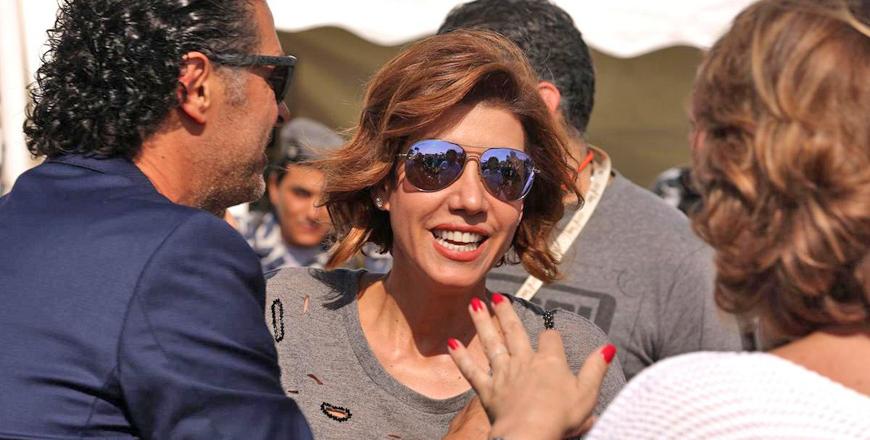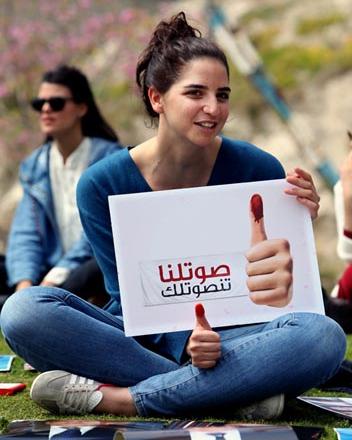You are here
Lebanese lawmaker fights ‘degrading’ citizenship law against women
By Thomson Reuters Foundation - Jan 17,2019 - Last updated at Jan 17,2019

Lebanese singer Ragheb Alameh (left) welcomes Lebanese TV host Paula Yacoubian (centre) during a karting race organised by Lebanese celebrities to mark the beginning of the Beirut Cultural Festival at Beirut’s water front on May 20, 2016 (AFP photo)
BEIRUT — Nine months after being voted into the 128-seat Lebanese parliament as one of six female lawmakers, Paula Yacoubian is urging fellow legislators to help change discriminatory laws that are an ‘‘injustice’’ against women.
Yacoubian, 42, won her seat as a civil society candidate in May’s election, and prides herself on being the first woman in Lebanon’s parliament not aligned with any political party in the country’s sectarian political system.
The former journalist turned lawmaker’s biggest battle is gaining nationality rights for thousands of stateless children born to Lebanese women.
In Lebanon, women married to foreigners cannot pass their Lebanese nationality on to their husbands or children.
‘‘There is so much injustice. You have thousands of kids in this country that have no rights - they are Lebanese, they grew up here, they speak only Arabic,’’ Yacoubian told the Thomson Reuters Foundation from her Beirut office.
‘‘It is not only about women - it is about suffering families... They don’t have a piece of paper that says that you have a nationality — it is degrading.’’
Stateless children cannot access public healthcare, have difficulty getting access to education, and when they are old enough, they cannot work without a permit, according to the law.
Additionally, women in some communities cannot inherit or own property regardless of who they marry.
Lebanon is far behind other countries in the region, like Tunisia, Morocco and Egypt, that have provided equal citizenship rights to men and women, activists who have worked on the issue said.
More protection
for women
Beyond reform, Yacoubian said it is critical for additional laws to be passed in order to protect young women’s health and against forced marriage.
There is no minimum age for marriage in Lebanon. Religious communities can allow girls younger than 15 to marry, according to Human Rights Watch.
Yacoubian supports KAFA, a local campaign group calling on Lebanon to pass a law to make 18 the minimum age for marriage — with no exceptions.
‘‘If there any exceptions to be made, it will not have the same impact. The message should be very clear — no marriage under 18,’’ she said.
Globally, 12 million girls marry before age 18 every year, according to Girls Not Brides, a coalition working to end child marriage.
KAFA said other Arab countries are a step ahead of Lebanon in setting 18 as the minimum marriage age, including Algeria, Egypt, Iraq, Jordan, Libya, Morocco, Oman, Tunisia and the United Arab Emirates.
Protecting women against violence also needs ‘‘a lot of work’’ in a country that passed a long-awaited law in 2014 against domestic violence, Yacoubian said.
But rights groups were outraged that authorities watered it down so much it fell short of criminalising marital rape.
A 2017 national study by ABAAD, a Lebanese women’s rights group, found that one in four women have been raped in Lebanon. Less than a quarter of those sexually assaulted reported it, the survey said.
Time for disruption
With women in Lebanon gaining only two seats in parliament in May’s election for a total of six, Yacoubian said there needs to be a 33 per cent quota to give women fair representation.
‘‘It is their rights first to be represented — to have equal chances. And because this is the real representation of Lebanon... more than half of the country is women. They should be represented in a way that reflects how the society works.’’
‘‘I think in the long run it can be disruptive for this patriarchal system that humiliates women.’’
Having women in lawmaking postitions will help boost women’s rights in a country where men do not view women as their equals — something she has experienced herself in the workplace, Yacoubian said.
‘‘I have MPs who treat me as if I am either a flower or something fragile ... We don’t have a culture that understands that women are equal to men,’’ she said.
Many months after May’s election, Lebanese leaders are still at odds over how to parcel out cabinet positions among rival groups as mandated by a political system that shares government positions among Christian and Muslim sects.
Yacoubian called it a ‘‘mafia system’’ that is running the country based off of religion, money and power — dominated by men.
She said she will ‘‘keep fighting’’ for women’s rights and is hopeful legal changes will be made to protect women.
‘‘I hope it will be soon because you will have less suffering, less problems. I am sure that one day this country will see a new horizon, a new light.’’
Related Articles
Lebanon’s parliament on Tuesday passed a law making domestic violence a criminal offence, after a years-long campaign by civil society groups in a sectarian Arab country steeped in conservativism.
BEKAA VALLEY, Lebanon — A 17-year-old Aziza sat in her dark tent in a refugee camp, she rocked her baby while her tiny hands adjusted his pa
AMMAN — Kafa Akroush is head of the Gender Unit at Jordan’s Ministry of Education (MoE).



















